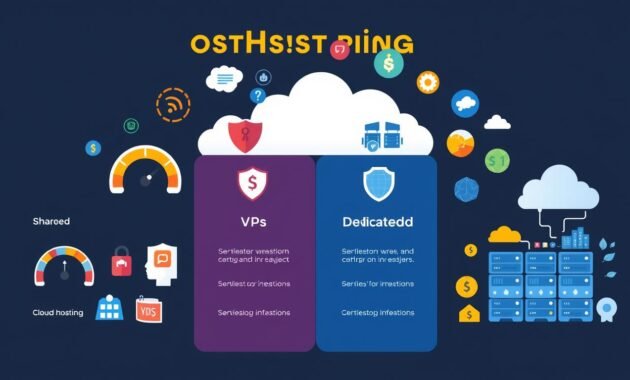I know how important a good hosting solution is for your website. Your website is your business’s online presence. It needs a hosting platform that offers top performance, flexibility, and peace of mind. In this article, I’ll help you explore web hosting options and find the best fit for your needs.
Whether you’re starting a new site or moving an old one, the right hosting makes a big difference. There are many hosting types, like shared, VPS, and dedicated servers. I’ll explain the good and bad of each, so you can choose wisely based on your budget, traffic, and future plans.
Key Takeaways
- Reliable hosting is essential for the success and stability of your website
- Understand the different hosting options available, from shared to dedicated servers
- Consider factors like uptime, server speed, and customer support when evaluating hosting providers
- Choose a hosting plan that can scale with your website’s growth and traffic demands
- Ensure your website is secure and protected from potential cyber threats
What is Web Hosting?
Web hosting is the key to your online presence. It gives you the tools and space to make your website live on the internet. Your website’s files are stored on a server, making it always available for visitors.
Understanding the Fundamentals
Web hosting means your website’s files are on a server. This server is powerful and ready for users to access your site. The hosting provider keeps your site running smoothly, ensuring a good experience for visitors.
Differentiating Hosting Types
- Shared Hosting: An affordable option where your website shares server resources with other sites.
- Virtual Private Server (VPS) Hosting: Offers more dedicated resources and scalability than shared hosting.
- Dedicated Server Hosting: Provides you with an entire server dedicated solely to your website, granting ultimate control and performance.
- Cloud Hosting: A flexible, scalable solution that harnesses the power of multiple interconnected servers.
Knowing about web hosting fundamentals and types of web hosting is key. It helps you pick the best option for your website. Whether it’s shared hosting, VPS hosting, dedicated server hosting, or cloud hosting, the right choice matters.
“Choosing the right web hosting plan can make all the difference in the success of your online business.”
Evaluating Hosting Providers
Choosing a web hosting provider is key. Look at uptime, reliability, server locations, and website speed. These factors greatly affect your website’s performance and how easily people can find it.
Uptime and Reliability
Uptime is how often your site is up and running. A good host promises a high uptime, like 99.9% or more. This keeps your site open for visitors, improving their experience and your brand’s image.
Server Locations and Speed
Where your host’s servers are matters for speed. Choose a host with servers near your main users. This cuts down on data travel time, making your site load faster.
| Hosting Provider | Uptime Guarantee | Server Locations | Average Website Speed |
|---|---|---|---|
| Provider A | 99.9% | North America, Europe, Asia | 800 ms |
| Provider B | 99.95% | North America, Europe | 700 ms |
| Provider C | 99.8% | North America | 900 ms |
By looking at these important points, you can pick a host that’s both reliable and fast. This ensures your site works well for visitors, helping your online success.
Shared Hosting: Affordable and Accessible
Shared hosting is a top choice for small businesses and individuals. It’s affordable and perfect for beginners. Your website shares server resources with others, making it cost-effective.
Shared hosting has many benefits. It’s easy to set up, so you can start your website fast. You don’t need to know a lot about web development or server management.
- Shared hosting is an affordable web hosting solution that caters to those with limited budgets.
- It offers a user-friendly interface and simplified management tools, making it accessible for beginners and small business owners.
- Shared hosting plans often include features such as email hosting, website builders, and content management systems, further enhancing the accessibility of this hosting option.
While it may not have the best performance or customization, shared hosting is still a good choice. It’s great for those who want to save money and don’t need advanced features. Think about your website’s needs and growth before choosing shared hosting.
“Shared hosting is the perfect starting point for small businesses and individuals looking to establish a strong online presence without breaking the bank.”
| Feature | Shared Hosting | VPS Hosting | Dedicated Server |
|---|---|---|---|
| Cost | Affordable | Moderate | High |
| Performance | Adequate | Improved | Highest |
| Customization | Limited | Flexible | Extensive |
| Technical Expertise Required | Low | Moderate | High |
Virtual Private Server (VPS) Hosting
The online world keeps changing, making scalable and high-performance hosting key. VPS hosting is a mix between shared and dedicated hosting. It gives you the best of both.
Scalability and Performance
Virtual private server (VPS) hosting gives you a part of the server’s resources. This means your site performs better and can grow. It can handle more traffic and big files without slowing down.
VPS hosting also grows with your site. If your site gets bigger, you can upgrade your VPS hosting. This way, your site stays fast and efficient.
“VPS hosting is the perfect solution for businesses that require more power and control than shared hosting, but don’t need the full resources of a dedicated server.”
With VPS hosting, you get the best of scalable hosting and high-performance hosting. This lets you focus on growing your online presence without worrying about the tech.

Dedicated Server Hosting
For websites needing a lot, dedicated server hosting is the best. You get all the server’s power, storage, and memory. This lets you make the server just right for your site. It’s perfect for sites with lots of visitors, special needs, or need lots of resources.
The Benefits of Dedicated Hosting
Dedicated server hosting has many benefits. It’s great for businesses and people with complex sites:
- Unbeatable speed and performance: Your site gets all the server’s power. This means it runs fast, even when lots of people are visiting.
- Custom setup: You can change the server’s settings to fit your site’s needs. This gives you full control over your hosting.
- Better security and privacy: Dedicated servers are safer than shared ones. You don’t share resources, so there’s less chance of security problems.
- Easy to grow: As your site gets bigger, you can upgrade your server. This means you can always keep up with your site’s needs.
Dedicated server hosting is perfect for sites with lots of visitors or special needs. It gives you the control and resources you need. This means your site runs smoothly and visitors have a great experience.
“Dedicated server hosting gives me the freedom to customize my hosting environment and scale my website as needed. The peace of mind and performance boost are invaluable.”
Cloud Hosting: The Future of Flexibility
Cloud hosting is changing the web hosting world. It offers a future-proof solution for everyone. Unlike old hosting models, cloud hosting uses distributed computing. This gives you unmatched flexibility and scalability.
Cloud-based web hosting adapts to your needs. Your website can grow or shrink as needed. This means you only pay for what you use, saving you money.
Also, cloud hosting is more reliable and has built-in redundancy. Your website’s data and resources are spread across many servers. This protects your site from server failures, keeping it up and running.
Cloud hosting is the future of web hosting. It offers flexible hosting solutions that let businesses focus on what they do best. You can quickly adjust resources to meet changing needs, helping you stay competitive.
As the digital world keeps changing, cloud hosting is a reliable choice. It helps businesses stay ahead and provide great user experiences.
Managed vs. Unmanaged Hosting
Choosing a hosting solution for your website involves deciding on management and support levels. The choice between managed hosting and unmanaged hosting affects your website’s performance, security, and management.
Managed Hosting: Comprehensive Support and Maintenance
Managed hosting includes a range of services. The provider handles server setup, software updates, security patches, and backups. This lets you focus on your business, leaving hosting support and hosting management to the experts.
Unmanaged Hosting: Greater Control, More Responsibility
Unmanaged hosting gives you server control but requires you to handle technical tasks. This includes software installation, configuration, and troubleshooting. It offers flexibility but demands technical skills and time from you or your team.
When choosing between managed and unmanaged hosting, think about your technical skills and resources. Managed hosting is good for small to medium-sized businesses or those with limited technical knowledge. It offers a hassle-free experience. Unmanaged hosting is better for experienced developers or organizations needing server control.
The choice between managed hosting and unmanaged hosting depends on the support and management you need. By evaluating your needs, you can pick the hosting that fits your website and team best.
HOSTING: The Heart of Your Online Presence
In today’s digital world, hosting is essential for a strong online presence. Your website is your digital identity. Reliable web hosting is key to its success. It affects how easily people can find and use your site.
The right hosting provider makes a big difference. Good hosting means your site is always up, fast, and safe. Choosing quality hosting is vital for your online success.
There are many hosting options, like shared, VPS, and dedicated servers. Knowing what each offers helps you pick the best for your needs and budget.
| Hosting Type | Ideal For | Key Benefits |
|---|---|---|
| Shared Hosting | Small to medium-sized websites with moderate traffic | Affordable, easy to set up, and suitable for beginners |
| VPS Hosting | Websites with growing traffic and resource demands | Scalable, more control over server resources, and improved performance |
| Dedicated Hosting | High-traffic websites, mission-critical applications, and resource-intensive projects | Unparalleled control, enhanced security, and maximum resources |
No matter the hosting, the core idea is the same: hosting is essential for a solid online presence. A good hosting provider keeps your site up, safe, and fast. This lets you focus on growing your online business.

“Reliable hosting is the foundation of a successful online presence. It’s the backbone that supports your website, ensuring it’s accessible, secure, and performing at its best.”
Security and Data Protection
In today’s digital world, keeping your website safe is crucial. Your hosting provider is key in protecting your site and its data. They help fight cyber threats and keep your users’ info private. Strong security features are vital for a trustworthy online space.
Keeping Your Website Safe
When picking a hosting provider, look for these security steps:
- Secure Socket Layer (SSL) or Transport Layer Security (TLS) encryption to protect data in transit
- Firewalls and intrusion detection systems to block unauthorized access
- Regular software updates and patches to address known vulnerabilities
- Secure server configurations to minimize the risk of exploits
- Robust backup and disaster recovery solutions to safeguard your data
These website security features make sure your site and data are top priorities. They give you and your users peace of mind.
Also, look for hosting providers with extra hosting security features. These include DDoS protection, file integrity monitoring, and web application firewalls. These advanced tools can make your online presence even safer.
“Securing your website is not just a luxury, but a necessity in today’s digital landscape. Choosing a hosting provider that prioritizes security can make all the difference in protecting your online assets.”
By choosing a hosting that focuses on website security and data protection, you can confidently grow your online presence. You’ll protect your business and your users’ sensitive information.
Website Backups and Disaster Recovery
As a website owner, bad things can happen. Server failures, natural disasters, or human errors can harm your online presence. That’s why it’s crucial to have regular website backups and a solid disaster recovery plan. With the right hosting backup solutions, you can quickly get your website back up and running.
Regular website backups are key to any good disaster recovery plan. Your hosting provider should offer comprehensive backup solutions that automatically create and store multiple versions of your website data, including your content, media files, and database information. These backups can be easily accessed and restored in an emergency, helping you get your website back up and running with little disruption.
A reliable disaster recovery plan is also vital. Your hosting provider should have redundant infrastructure, like geographically distributed data centers and failover mechanisms. This ensures your website stays accessible even during natural disasters or other unexpected events. With these safeguards, you can rest easy knowing your online presence is safe.
Investing in website backups and disaster recovery services from your hosting provider is a small price for peace of mind and business continuity. Don’t wait until it’s too late. Make sure your website is backed up and your disaster recovery plan is ready. This way, you can focus on growing your online presence without worrying about losing it all.
The Importance of Backup and Recovery
- Protect your website data from unexpected events
- Minimize downtime and ensure business continuity
- Quickly restore your website and its content
- Leverage your hosting provider’s redundant infrastructure
| Feature | Benefit |
|---|---|
| Automatic Website Backups | Regularly save your website data to prevent loss |
| Disaster Recovery Plan | Ensure your website remains accessible during emergencies |
| Geographically Distributed Data Centers | Provide redundancy and minimize the impact of local disasters |

“A well-designed backup and disaster recovery plan is the cornerstone of a resilient online presence.”
Migrating to a New Hosting Provider
Switching to a new hosting provider can seem scary. But, with the right steps, you can make the move smoothly. This section will guide you through the key steps to ensure a seamless transition.
Tips for a Smooth Transition
Moving your website to a new host needs careful planning. Here are some tips to help you:
- Plan the migration timeline: Give yourself enough time for the move. Consider your website’s size, the host’s availability, and any dependencies.
- Backup your website: Make a full backup of your site before moving. This is your safety net in case of migration issues.
- Communicate with your current hosting provider: Tell your current host about your plans. Ask for any special migration tips they might have.
- Evaluate the new hosting plan: Check if the new plan fits your website’s needs. Look at storage, bandwidth, and any special requirements.
- Test the migration process: Try a test migration to a staging site. This helps find and fix any problems before the real move.
- Update your DNS settings: After the move, update your domain’s DNS to point to the new host. This makes your site accessible to visitors.
By following these tips, you can make a successful and stress-free hosting migration or website migration. This way, you can confidently move to your new hosting provider.
| Consideration | Importance |
|---|---|
| Backup your website | High |
| Communicate with current provider | High |
| Test the migration process | High |
| Update DNS settings | High |
“A successful website migration is the result of careful planning, clear communication, and meticulous execution.”
Choosing the Right Hosting Plan
Finding the right hosting plan for your website can be tough. There are so many choices out there. But, by knowing what matters most, you can pick a plan that fits your needs now and in the future. Let’s look at the important things to think about when picking a hosting plan.
Evaluating Your Resource Requirements
First, figure out what your website needs. Think about how many visitors you expect, how much storage you’ll need, and how much bandwidth you’ll use. Knowing this helps you pick a plan that will keep your site running smoothly and growing.
Prioritizing Hosting Plan Features
- Uptime Guarantee: Find a host that promises your site will always be up. This keeps your visitors happy.
- Server Locations: Pick a host with servers close to your visitors. This makes your site load faster.
- Security and Backups: Choose a host that keeps your site safe and backs up your data regularly.
Comparing Hosting Plan Pricing
Cost is important, but don’t forget about what you get for your money. Look at different plans and see what they offer. This way, you can find the best deal for your website.
| Hosting Plan | Storage | Bandwidth | Price |
|---|---|---|---|
| Shared Hosting | 10 GB | 100 GB | $3.99/month |
| VPS Hosting | 50 GB | 1 TB | $19.99/month |
| Dedicated Server | 500 GB | 10 TB | $99.99/month |
By looking at what you need, focusing on important features, and comparing prices, you can find the perfect hosting plan. This will help your website succeed.

Optimizing Your Website for Performance
As a website owner, making your site fast and easy to use is key to success online. Your hosting is important, but there’s more you can do. We’ll look at caching, compression, and Content Delivery Networks (CDNs) to make your site faster and more responsive.
Caching: Boosting Load Times
Caching is a great way to speed up your website. It stores often-used content in the browser or a local server. This makes pages load quicker, giving users a better experience. Caching works well for sites with lots of static content like images and scripts.
Compression: Reducing Data Transmission
Compression helps make your website faster by shrinking files. By compressing HTML, CSS, and JavaScript, you make pages load quicker. Tools like Gzip and Brotli can cut down data size, making your site more efficient.
Content Delivery Networks (CDNs): Distributed Performance
CDNs are a smart way to boost your website’s speed. They use servers all over the world to serve content, like images and videos. This means users get faster page loads, no matter where they are.
Using these strategies can make your website run at its best. It will give users a great experience and help your site perform better. Investing in optimization can really pay off, leading to more visitors, sales, and happy customers.
Conclusion
Reliable hosting is key to a successful online presence. It’s important to know the different hosting options. This includes shared hosting and dedicated servers.
When choosing a host, look at uptime, server locations, and security. These factors help your website run smoothly and offer a great user experience.
Improving your website’s performance is also crucial. Use caching, compression, and content delivery networks to speed up your site. This makes it easier for visitors to access your content.
Keeping your website secure is vital. Use strong security measures and back up your data regularly. This protects your digital assets and keeps your online presence safe.
Your hosting choice is a big investment in your online success. Make smart decisions and keep improving your hosting strategy. This will help you build a strong, reliable, and high-performing online presence.
With a solid hosting solution, you can represent your brand well. Engage your audience and achieve your goals online.



